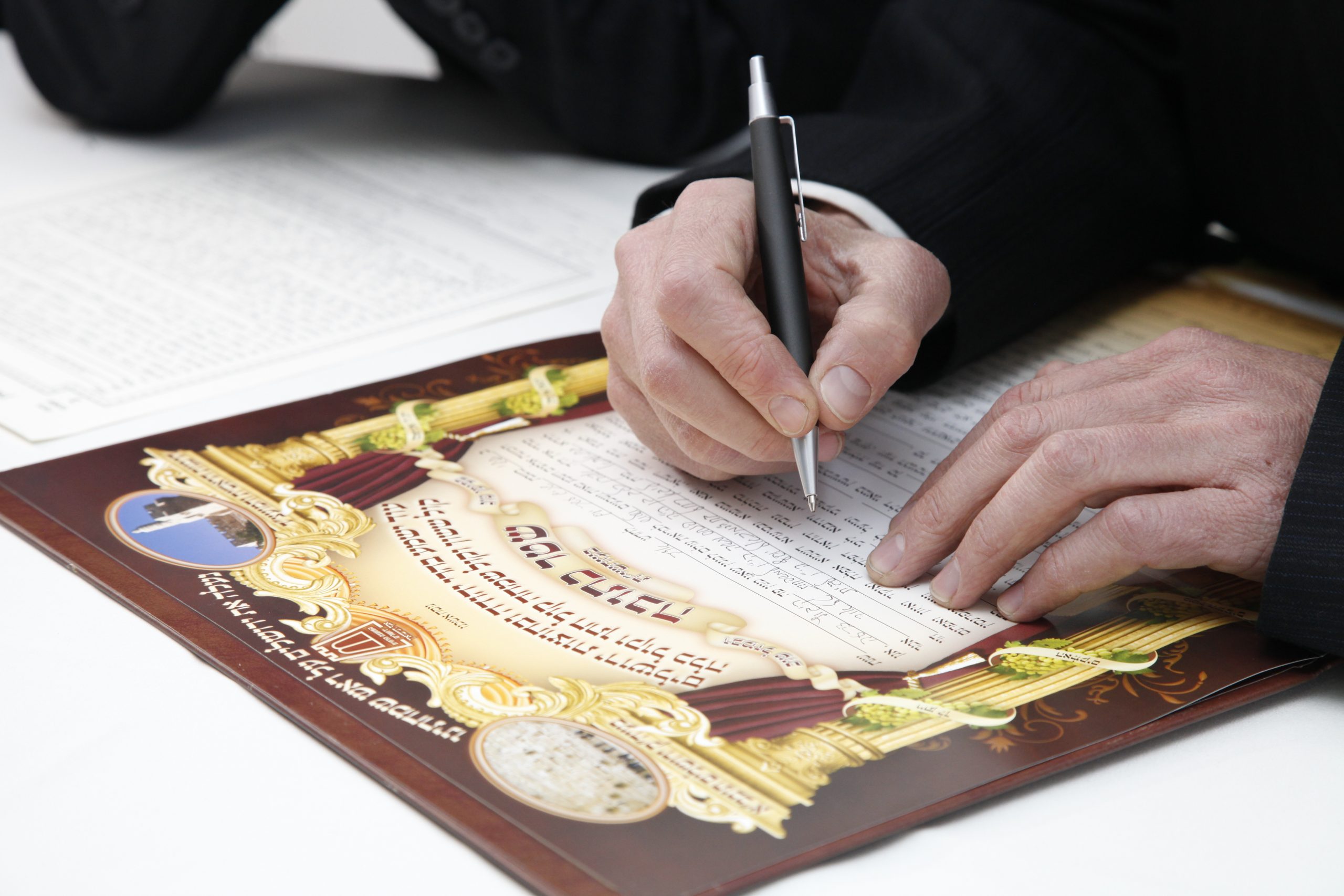
The Agunah Crisis: How to Protect Yourself
Written by Ellen Frank Bayer
Shoshanna Keats Jaskoll marched into the meeting like a woman on a mission. It was a Saturday night, and we were here to sign postnuptial agreements. Shoshanna was on her way to Lakewood. She was leaving back to Israel in two days, but she stopped off in Cedarhurst for a “postnup” signing ceremony for one more success towards stopping the agunah crisis.
“There are too many sad stories in my work. I am so happy to be here tonight,” Shoshanna told us that night. The Halachic prenup agreement is the best way to prevent someone from becoming an agunah. If you didn’t sign a prenup, it is not too late to sign a postnup. Both contracts will prevent you from becoming an agunah. The signing of the postnup was a beautiful event and felt like the couples signing were renewing their love for each other.
An agunah is Jewish woman who is halachically stuck in a marriage, literally “chained” to her husband. Such a woman is not free to remarry and any child she has that is not from this husband is illegitimate in the eyes of halacha.
Historically this happened due to a husband disappearing while traveling or going out to war, because halacha requires confirmation of a husband’s death for his wife to be released from the marriage. More recently, the term has been applied to women whose husbands refuse to grant them a get (a halachic divorce). While there are ways that halachic authorities can release a woman whose husband has disappeared, there is nothing that can be done for a woman whose husband is clearly alive, and according to halacha, he must give the get of his own free will. This situation has caused a “crisis” of men refusing to give a get either out of vindictiveness or to manipulate a more favorable divorce settlement. It should be noted that when a woman refuses to receive a get, her husband may also not remarry halachically, but since any children fathered in this situation are not halachically illegitimate, he has more options open to him.
The agunah crisis recently received monumental attention when in February 2021 social media exploded after singer Dalia Oziel posted the #freechava campaign. As a result, there was a rush of media attention on prenups and postnups. In Israel, after Shira Isakov was almost murdered by her husband, Aviad Moshe, the Beit Din threatened him with solitary confinement before he gave her a get.
My child’s former babysitter waited 15 years before her husband finally gave her a get. When
you take a look at the men who refuse to give their wives a get on the website GETORA.org, they all look like nice respectable men, happy, smiling from Teaneck, Los Angeles and Queens. If you think it can’t happen to you, think again. It can. Everything changes when marriages fall apart. It takes open communication, devotion and caring to keep a marriage together. When marriages fall apart, walls go up. Everything thatpreviously held it together, now becomes a wall.
People spend months, sometimes even over a year, planning a wedding. The dress can take twelve months to prepare, getting all the fittings right, having the right fabric, getting the wedding party outfitted. The future couple may audition the band, look at many different videographers and florists, but often sadly overlook the most important part of the ceremony: the commitment they are making toward each other.
The good news is that the situation is easily avoided. Take the time, protect yourself and sign a halachic prenuptial agreement. If you are already married, it is not too late to sign a postnup. Both the prenuptial agreement and the postnuptial agreement are signed contracts where both parties agree that in case of divorce the husband will not refuse to issue a get and the wife will not refuse to accept the get. The International Young Israel Movement in Israel has translated the agreements into five languages and makes them very easy for you to download and use. Chochmat Nashim, founded by Shoshanna Keats Jaskoll and Anne Gordon, believe it is their mission to end the agunah crisis and “use grassroots organizing to fix the problems in the Jewish community.”
Rabbi Mordechai Willig, in consultation with other halachic and legal experts, drafted the halachic prenup to prevent the agunah crisis. In 2019, the Rabbinical Council of America launched the “I Support the Use of a Halachic Prenup Campaign” and today all members of the RCA encourage couples to sign the prenup before the marriage ceremony. According to The Rabbinical Council of America the prenup works! The prenup form is available from The Organization for the Resolution of Agunot, otherwise known as ORA. See https://www.getora.org/prenup-forms. Today, all Rabbis who are part of the Beth Din of America have committed to make Rabbinical Prenup part of the marriage ceremony. Couples are advised to sign this document before the marriage ceremony to ensure, in case of divorce, the husband will not refuse to give his wife a get and the wife will not refuse to accept the get. The prenup is a contract, and like the ketubah, commits the husband and wife to provide for each other’s needs and ensure mutual respect.
The prenuptial agreement is a legal contract which binds you and your spouse to commit to two specific items in an uncontested divorce: 1. Appear before a specific beit din and abide by itsdecision with regards to giving a get and 2. Pay a monetary incentive which is enforceable in civil court if the spouse refuses to give a get. The monetary incentive applies to both the male if he refuses to give the get and the female if she refuses to accept the get.
According to Dr. Rachel Levmore, Director of the Get-Refusal Prevention Program, signing the prenup or postnup actually strengthens your marriage. It shows your spouse that “I love you so much I even want to protect you from myself.” In case of divorce, it actually encourages cooperation and prevents the children from becoming weapons in the break-up of the marriage.
The mission of Chomat Nashim is to end the agunah crisis and “use grassroots organizing to fix the problems in the Jewish community,” but they cannot do it alone. Each and every one of us needs to encourage engaged and married couples to sign a halachic prenuptial or postnuptial agreement.
According to Shoshanna Keats Jaskoll, every woman is a potential agunah. Protect yourself and your daughters by insisting they sign a prenup. Follow Chochmat Nashim on Instagram. Get involved. Repost and add your comments. Keep up the momentum. Great change only happens with persistence, planning and the tenacity of the few. It takes work, it takes time, it takes effort. It’s worth it.
Links for more information
https://www.chochmatnashim.org/heres-my-plan-to-free-women-from-get-abuse/
https://www.getora.org/faqs-about-the-prenup
https://18forty.org/articles/the-learned-and-the-lived-an-agunah-timeline/
https://www.ou.org/life/relationships/ending-agunah-problem-as-we-know-it-shlomo-wiessmann/
https://theprenup.org/explaining-the-prenup/rabbinic-endorsements/
https://www.skjaskoll.com/will-civil-courts-be-the-salvation-of-chained-jewish-women/

According to Dr. Rachel Levmore, Director of the Get-Refusal Prevention Program, signing the prenup or postnup actually strengthens your marriage. It shows your spouse that “I love you so much I even want to protect you from myself.”
Related Articles
Related
Is it OK to Pray at a Grave?
“I am going to the grave of Rabbi Meir the miracle worker, to pray that I find my lost wedding ring.” “I am going to the Amuka, the grave of Yonatan Ben Uzi’el, to pray for a shidduch (marriage partner).” “I am going to visit the grave of Rabbi Gedalya Moshe of...
Kumzitz and Laugh
In the darkest recesses of the human mind, in a place so heavy with shadow it seems impossible for a pinprick of light to shine through, a spark exists. That tiny ray seems like a direction, a point of promise, a simple moment of relief from the reality of the world...
Dealing With Difficult People
Life is filled with stumbling blocks. Things often do not go as planned. A great deal of this is beyond our control. Situations such as weather, glitches in technology, health issues, accidents, unexpected delays and life changing events will happen. There is one...

